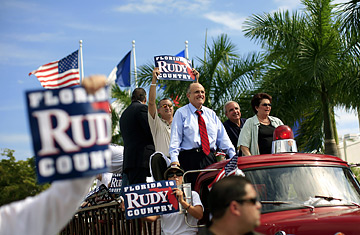
Rudy Giuliani, 0 for 4 so far, campaigns in Miamis Little Havana neighborhood
Rudy Giuliani has been running for President in a blur—literally. He needs his eyeglasses to see distance, but at most events he won't wear them. Instead, he rattles through his stump speech—tax cuts increase revenue, beware of Hillary Clinton, remember 9/11—while gazing into a fuzzy void. The spectacles come on only briefly, during question time, so he can make eye contact with his inquisitors.
This is ironic because Giuliani has run the most strategically farsighted campaign in the Republican field. When he came in fifth in Iowa, he hardly flinched. "We put our emphasis on other places," he said. When a Southern pastor, Mike Huckabee, beat him in New Hampshire, Giuliani was upbeat. "This is just the beginning," he chirped. When the libertarian scold Ron Paul cleaned his clock in South Carolina, the former New York mayor acted as if victory would soon be upon him. "I'm an optimist," he announced.
In the face of an unending stream of bad news, the onetime front runner has kept his sights fixed firmly on the Jan. 29 primary in Florida. That's where he plans to finally score a win and rack up 57 delegates in the state's winner-take-all contest.
With rare exceptions, the media railbirds and political pros roll their eyes. Even "America's mayor," they reason, cannot bypass a month of electoral fever with some early birddinner glad-handing. "We recognized, by doing this unconventional approach, there would be a good deal of criticism," says Mike DuHaime, Giuliani's campaign manager. "But we have used our time well."
By that he means that for months the Giuliani campaign has been banking on a little-noticed advantage it has built among the orange groves and shuffleboard courts—a grass-roots army of over 6,000 volunteers who have been making more than a million phone calls to get Giuliani supporters to vote early. If historical trends hold, roughly one-third of the Republican votes in Florida will be cast before Election Day, either by absentee ballot or by "early voting" at polling places set up across the state.
